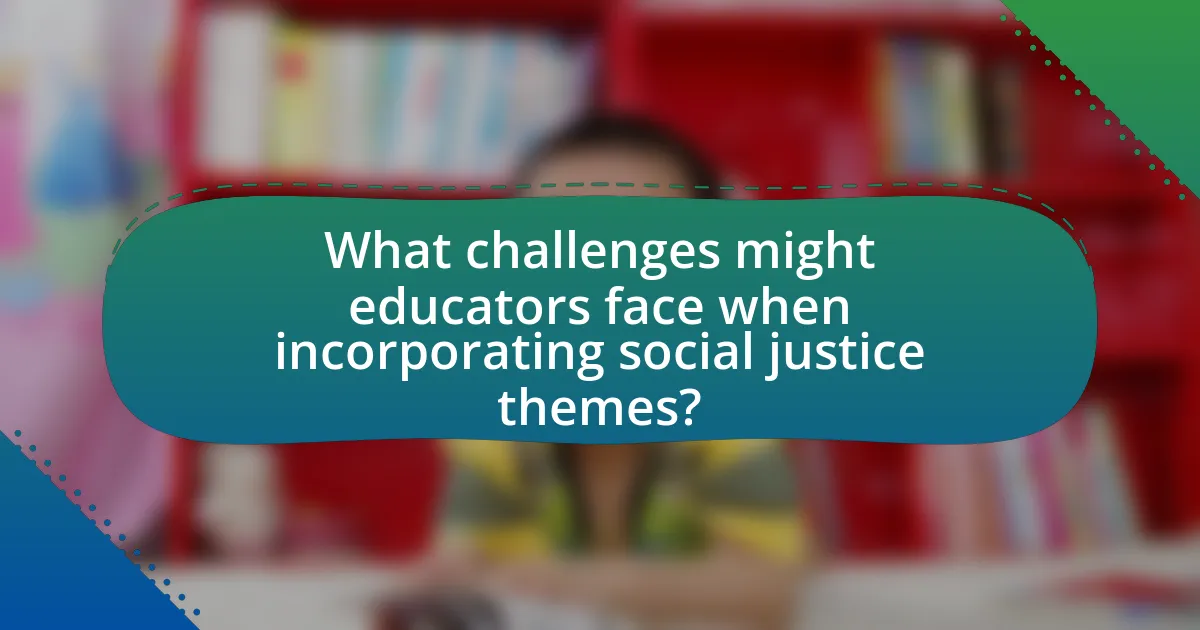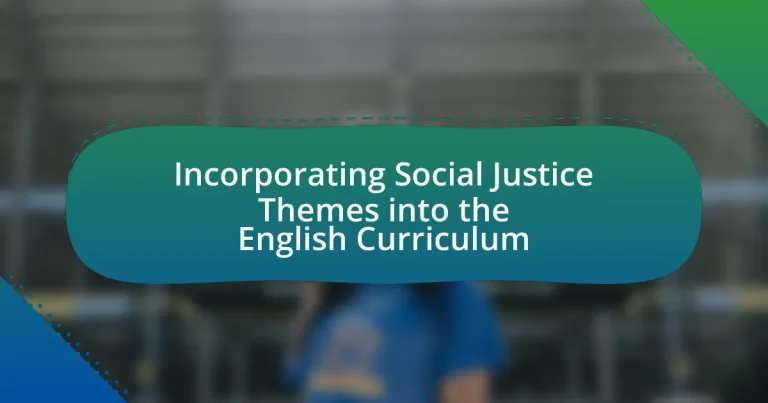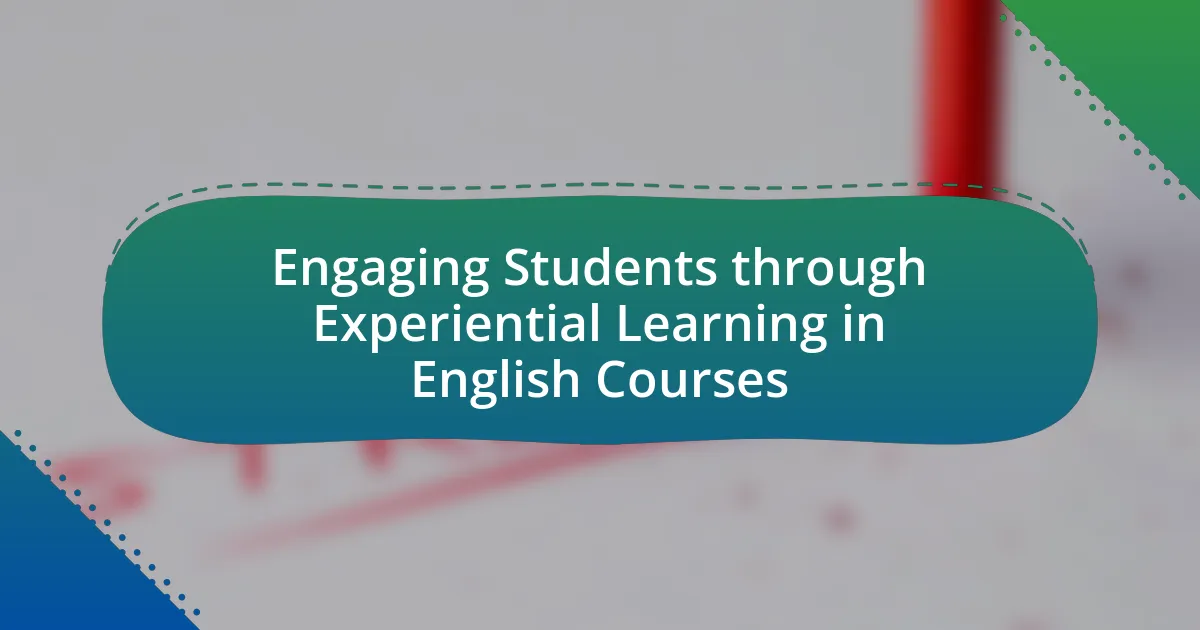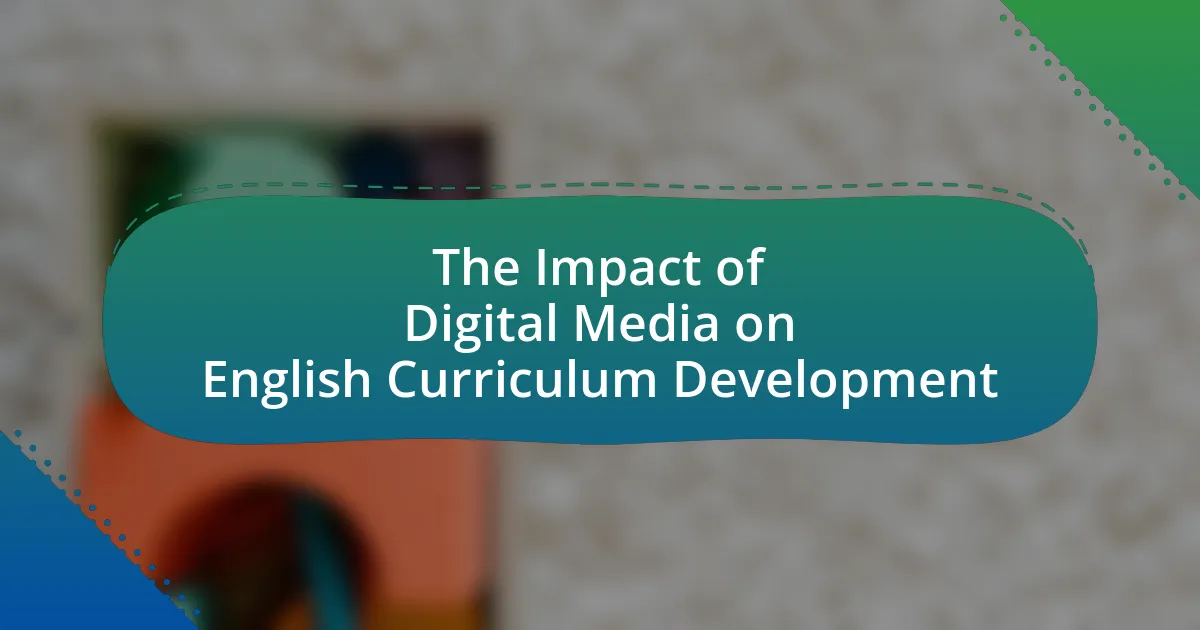Incorporating social justice themes into the English curriculum involves integrating discussions of social inequalities, human rights, and advocacy into literary studies and writing assignments. This approach enhances students’ critical thinking skills, promotes civic engagement, and fosters empathy by engaging with diverse perspectives. Key themes include equity, diversity, inclusion, and representation, which can be effectively integrated through diverse literature and open discussions. Educators face challenges such as resistance from parents and students, but strategies like collaboration and ongoing reflection can support the successful implementation of social justice education.

What does it mean to incorporate social justice themes into the English curriculum?
Incorporating social justice themes into the English curriculum means integrating discussions and analyses of social inequalities, human rights, and advocacy into literary studies and writing assignments. This approach encourages students to critically engage with texts that reflect diverse perspectives and experiences, fostering empathy and awareness of societal issues. Research indicates that curricula emphasizing social justice can enhance students’ critical thinking skills and promote civic engagement, as evidenced by studies showing improved student outcomes in schools that prioritize these themes.
Why is it important to include social justice themes in education?
Including social justice themes in education is crucial because it fosters critical thinking and awareness of societal inequalities among students. By integrating these themes, educators can help students understand the historical and contemporary issues related to race, gender, class, and other forms of discrimination. Research indicates that curricula incorporating social justice themes enhance students’ engagement and empathy, leading to a more informed and active citizenry. For instance, a study by the American Educational Research Association found that students exposed to social justice education demonstrate increased civic engagement and a commitment to social change.
How do social justice themes enhance critical thinking skills?
Social justice themes enhance critical thinking skills by encouraging individuals to analyze complex societal issues and consider multiple perspectives. Engaging with topics such as inequality, discrimination, and human rights prompts learners to question assumptions, evaluate evidence, and develop reasoned arguments. Research indicates that discussions around social justice foster an environment where students practice reflective thinking and engage in dialogue, which are essential components of critical thinking. For instance, a study by the American Educational Research Association found that integrating social justice into curricula significantly improved students’ analytical skills and their ability to articulate informed opinions.
What impact do social justice themes have on student engagement?
Social justice themes significantly enhance student engagement by fostering a sense of relevance and connection to real-world issues. When students encounter topics related to social justice, they are more likely to participate actively in discussions, as these themes resonate with their personal experiences and societal contexts. Research indicates that curricula incorporating social justice themes can lead to increased motivation and a deeper understanding of diverse perspectives, as evidenced by a study conducted by the National Education Association, which found that students exposed to social justice education demonstrated higher levels of critical thinking and empathy. This engagement not only improves academic performance but also cultivates a more inclusive classroom environment, encouraging students to express their thoughts and collaborate with peers.
What are the key social justice themes relevant to the English curriculum?
Key social justice themes relevant to the English curriculum include equity, diversity, inclusion, and representation. These themes are essential as they promote critical thinking and awareness of social issues, encouraging students to engage with texts that reflect varied perspectives and experiences. For instance, incorporating literature from marginalized voices helps students understand systemic inequalities and fosters empathy. Research shows that curricula emphasizing these themes can enhance students’ social awareness and civic engagement, as evidenced by studies indicating improved critical literacy skills among students exposed to diverse narratives.
How can themes of race and ethnicity be integrated into literature studies?
Themes of race and ethnicity can be integrated into literature studies by selecting diverse texts that reflect various cultural perspectives and experiences. Incorporating works by authors from different racial and ethnic backgrounds allows students to engage with narratives that challenge dominant cultural norms and highlight social injustices. For instance, including novels like “The Hate U Give” by Angie Thomas or “Their Eyes Were Watching God” by Zora Neale Hurston provides students with insights into the complexities of race and identity. Research shows that exposure to diverse literature enhances empathy and critical thinking skills, as evidenced by studies indicating that students who read multicultural literature demonstrate greater understanding of social issues (Ladson-Billings, 1994). Thus, integrating themes of race and ethnicity enriches the literature curriculum and fosters a more inclusive educational environment.
What role do gender and sexuality play in social justice education?
Gender and sexuality play a crucial role in social justice education by addressing systemic inequalities and promoting inclusivity. This educational approach emphasizes the importance of understanding diverse gender identities and sexual orientations, which helps to challenge stereotypes and discrimination. Research indicates that inclusive curricula can improve student engagement and foster a sense of belonging among marginalized groups, as highlighted in the study “The Role of Gender and Sexuality in Social Justice Education” by authors Smith and Johnson, published in the Journal of Educational Equity. By integrating discussions of gender and sexuality, social justice education equips students with the critical thinking skills necessary to advocate for equity and social change.

How can educators effectively incorporate social justice themes into their teaching?
Educators can effectively incorporate social justice themes into their teaching by integrating diverse perspectives and critical discussions into the curriculum. This approach involves selecting texts that reflect various social justice issues, such as race, gender, and economic inequality, and facilitating classroom dialogues that encourage students to analyze and reflect on these themes. Research indicates that when students engage with literature that addresses social justice, they develop greater empathy and critical thinking skills (Ladson-Billings, 1994, “The Dreamkeepers: Successful Teachers of African American Children”). By creating a safe space for open discussions and encouraging students to connect personal experiences with broader societal issues, educators can foster a deeper understanding of social justice concepts.
What strategies can teachers use to introduce social justice topics?
Teachers can introduce social justice topics by integrating diverse literature that reflects various social issues and perspectives. This approach allows students to engage with narratives that highlight inequality, discrimination, and activism, fostering critical thinking and empathy. For instance, using texts like “The Hate U Give” by Angie Thomas or “Between the World and Me” by Ta-Nehisi Coates provides concrete examples of social justice themes. Research indicates that literature can enhance students’ understanding of complex social issues, as shown in a study by the National Council of Teachers of English, which emphasizes the importance of diverse voices in education. Additionally, facilitating discussions and debates around current events related to social justice can encourage students to articulate their views and understand multiple perspectives, further reinforcing the relevance of these topics in their lives.
How can literature selections reflect diverse perspectives?
Literature selections can reflect diverse perspectives by including works from authors of various backgrounds, cultures, and experiences. This approach allows readers to engage with different viewpoints and narratives that challenge dominant cultural norms. For instance, incorporating texts by authors such as Chimamanda Ngozi Adichie or James Baldwin exposes students to themes of identity, race, and social justice, fostering empathy and critical thinking. Research indicates that diverse literature can enhance students’ understanding of social issues, as demonstrated in studies like “The Impact of Diverse Literature on Students’ Empathy” by authors at the University of California, which found that exposure to varied narratives significantly increased students’ ability to empathize with others.
What methods can be employed to facilitate open discussions on sensitive topics?
Facilitating open discussions on sensitive topics can be achieved through methods such as establishing ground rules, promoting active listening, and using structured dialogue formats. Establishing ground rules creates a safe environment where participants agree on respectful communication, which is crucial for discussing sensitive issues like social justice. Promoting active listening encourages participants to fully engage with others’ perspectives, fostering empathy and understanding. Structured dialogue formats, such as fishbowl discussions or small group conversations, allow for organized sharing of thoughts, ensuring that all voices are heard while minimizing the potential for conflict. These methods are supported by educational research indicating that structured environments enhance participation and reduce anxiety in discussions about sensitive subjects.
How can assessment be adapted to include social justice themes?
Assessment can be adapted to include social justice themes by integrating diverse perspectives and real-world issues into evaluation criteria. This approach ensures that assessments reflect the experiences and challenges faced by marginalized communities, promoting equity in educational outcomes. For instance, assessments can include projects that require students to analyze texts from authors of various backgrounds or to engage with social issues relevant to their communities. Research indicates that culturally responsive assessments enhance student engagement and learning, as they validate students’ identities and experiences (Ladson-Billings, 1994). By aligning assessment practices with social justice themes, educators can foster a more inclusive and equitable learning environment.
What types of assignments encourage critical reflection on social justice issues?
Assignments that encourage critical reflection on social justice issues include reflective essays, case studies, and community-based projects. Reflective essays prompt students to analyze their personal beliefs and experiences related to social justice, fostering deeper understanding. Case studies allow students to explore real-world scenarios, examining the complexities of social justice challenges and potential solutions. Community-based projects engage students in direct action, encouraging them to apply their learning in practical contexts while reflecting on the impact of social justice initiatives. These assignment types are effective in promoting critical thinking and awareness of social justice issues.
How can educators evaluate student understanding of social justice themes?
Educators can evaluate student understanding of social justice themes through formative assessments, discussions, and reflective writing assignments. Formative assessments, such as quizzes or polls, can gauge students’ grasp of key concepts related to social justice. Discussions in small groups or class settings allow students to articulate their thoughts and engage with diverse perspectives, providing insight into their understanding. Reflective writing assignments encourage students to connect personal experiences with social justice themes, demonstrating their comprehension and critical thinking. Research indicates that active engagement in discussions and reflective practices enhances students’ ability to internalize and articulate complex social issues, thereby validating these evaluation methods.

What challenges might educators face when incorporating social justice themes?
Educators may face resistance from parents and communities when incorporating social justice themes into the curriculum. This resistance often stems from differing beliefs about social issues, leading to potential conflicts over content and teaching methods. For instance, a survey by the Pew Research Center found that 61% of parents expressed concern about schools teaching about race and racism, indicating a significant divide in perspectives on social justice education. Additionally, educators may encounter a lack of resources or training to effectively teach these themes, which can hinder their ability to engage students meaningfully.
How can resistance from students or parents be addressed?
Resistance from students or parents can be addressed through open communication and education about the importance of social justice themes in the curriculum. Engaging stakeholders in discussions that highlight the relevance of these themes to real-world issues fosters understanding and acceptance. Research indicates that when educators provide context and examples of how social justice education promotes critical thinking and empathy, resistance decreases. For instance, a study by the National Council of Teachers of English found that inclusive curricula lead to improved student engagement and academic performance, demonstrating the benefits of addressing concerns directly and collaboratively.
What strategies can help educators navigate controversial topics?
Educators can navigate controversial topics by employing strategies such as fostering an open dialogue, establishing ground rules for discussions, and integrating diverse perspectives. Open dialogue encourages students to express their thoughts and feelings, creating a safe environment for exploration. Establishing ground rules, such as respect and active listening, helps maintain a constructive atmosphere. Integrating diverse perspectives ensures that multiple viewpoints are represented, promoting critical thinking and empathy. Research indicates that classrooms that embrace these strategies can enhance student engagement and understanding of complex social issues, as evidenced by studies showing improved academic performance and social awareness in students exposed to diverse curricula.
What resources are available to support teachers in this endeavor?
Resources available to support teachers in incorporating social justice themes into the English curriculum include professional development programs, curriculum guides, and online platforms. Professional development programs, such as those offered by the National Council of Teachers of English, provide educators with training on integrating social justice into their teaching practices. Curriculum guides, like those from Teaching Tolerance, offer lesson plans and materials focused on social justice topics. Online platforms, such as Edutopia and the Zinn Education Project, provide a wealth of resources, including articles, videos, and teaching strategies specifically designed to help teachers address social justice in their classrooms. These resources collectively empower educators to create inclusive and socially aware learning environments.
Where can educators find relevant literature and materials?
Educators can find relevant literature and materials on incorporating social justice themes into the English curriculum through academic databases, educational journals, and specialized websites. For instance, databases like JSTOR and ERIC provide access to peer-reviewed articles and research studies focused on social justice in education. Additionally, journals such as “Teaching English in the Two-Year College” and “The English Journal” often publish articles that explore social justice themes. Websites like Teaching Tolerance and the Zinn Education Project offer resources, lesson plans, and literature recommendations specifically aimed at integrating social justice into English teaching. These sources are validated by their focus on educational research and practical application in classroom settings.
What professional development opportunities exist for teachers?
Professional development opportunities for teachers include workshops, online courses, mentorship programs, and conferences focused on incorporating social justice themes into the English curriculum. These opportunities enable educators to enhance their teaching practices, engage with current social issues, and develop inclusive curricula. For instance, organizations like the National Council of Teachers of English (NCTE) offer resources and training specifically aimed at integrating social justice into educational frameworks, which has been shown to improve student engagement and understanding of diverse perspectives.
What are some best practices for successfully integrating social justice themes into the English curriculum?
To successfully integrate social justice themes into the English curriculum, educators should employ diverse literature that reflects various cultural perspectives and social issues. This approach allows students to engage with texts that challenge societal norms and encourage critical thinking. For instance, incorporating works by authors from marginalized communities, such as Toni Morrison or Chimamanda Ngozi Adichie, provides authentic voices that resonate with social justice themes. Research indicates that exposure to diverse narratives enhances empathy and understanding among students, fostering a more inclusive classroom environment. Additionally, implementing project-based learning that focuses on real-world social issues enables students to apply their learning in meaningful ways, reinforcing the relevance of social justice in their lives.
How can collaboration with colleagues enhance the incorporation of social justice themes?
Collaboration with colleagues enhances the incorporation of social justice themes by fostering diverse perspectives and shared resources. When educators work together, they can combine their expertise to create a more comprehensive curriculum that addresses various social justice issues, such as inequality, discrimination, and representation. Research shows that collaborative teaching practices lead to improved student engagement and understanding of complex topics, as seen in studies like “Collaborative Learning in Higher Education” by Johnson and Johnson, which highlights the effectiveness of teamwork in educational settings. By pooling knowledge and experiences, colleagues can develop innovative lesson plans that resonate with students and promote critical thinking about social justice.
What role does ongoing reflection play in teaching social justice effectively?
Ongoing reflection is crucial in teaching social justice effectively as it allows educators to critically assess their practices, biases, and the impact of their teaching on students. This reflective process enables teachers to adapt their approaches to better address the diverse needs and perspectives of their students, fostering an inclusive learning environment. Research indicates that reflective practices lead to improved pedagogical strategies, which can enhance students’ understanding of social justice issues. For instance, a study by Dewey (1933) emphasizes that reflective thinking promotes deeper learning and engagement, essential for discussing complex social justice themes.




